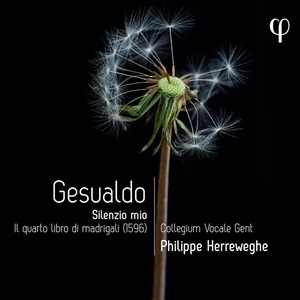
Carlo Gesualdo (1566-1613)
Silenzio Mio
Madrigali a cinque voci, Libro quarto (1596)
Collegium Vocale Gent/Philippe Herreweghe
rec. 2023, Karmelietenkerk, Ghent, Belgium
PHI LPH043 [43]
The music of Carlo Gesualdo exercises a powerful hold over listeners in the 21st century, as much for his colourful lifestyle as for his harmonic adventurousness. His music is so widely enjoyed and performed now that we have come to appreciate that there are lots of different ways of bringing it to life. Philippe Herreweghe and his choir, the Collegium Vocale Gent, firmly and tranfixingly embrace the path of sensuality.
The first thing that strikes you in this recording of Gesualdo’s Fourth Book of Madrigals is the sheer sweetness of the sound. That’s completely appropriate for this time of the composer’s career: his most daring experiments in chromaticism came in his final two books of madrigals, whereas the fifth contains only a few steps in that direction. The listener, and especially the newcomer to Gesualdo, therefore gets the best of both worlds: some of the chromatic adventurousness coupled with the richness of his finest harmonic part-writing. The booklet notes quote a scholar who describes this book of madrigals as “the optimal point of discovery” for the composer’s music, for those very reasons.
The Collegium Vocale Gent understand this instinctively, and they craft a sequence of beautifully expressed, intensely felt vignettes, most no more than a couple of minutes long. The euphoniousness of the interplaying lines is clear and always marvellously beautiful. However, they make the most of every passing discord or nerve-jangling suspension on the words associated with pain, like lagrime, sospiri or morra. Each madrigal, therefore, feels like a tightly focused voyage into the souls of both the composer and the performers, creating results that are both musically sumptuous and at times alarmingly intimate.
Careful thought has also been given to the colour of each madrigal. In No 5, for example, the upper voices dominate, giving it an airborne feeling of sunlit love-play. In No 3, on the other hand, the low voices are more prominent, making this a much more moody, introspective journey into the pains of love and the sorrows of rejection.
It’s hard to tell how much Herreweghe is involved in the production of each piece, though one imagines it’s probably quite a lot. His face appears prominently in the booklet, and it’s his record label, after all. Equally, however, it’s easy to imagine each piece being self-directed by the singers, so fresh and spontaneous does all of the phrasing and expression sound. The six of them are deservedly names individually in the booklet, as is Jonas Nordberg, whose lute playing is every bit as central to the success of each piece.
I can’t imagine there are many listeners who’ll intentionally sit down and listen to the whole disc in one sitting, unless they’re an encyclopaedic completist, or a total immersion fan, and there’s joy in that as well. Most of us, however, will see this as a tasting menu of intensely flavoured treats, to be consumed with care and at leisure, processing each in turn before moving on to the next, lest the appetite cloys by surfeit. However you intend to listen, though, it’s hard to imagine more intelligent performers or a more refined atmosphere in which to experience Gesualdo’s music.
And it helps that the recorded sound is exemplary, close to the ear, while giving the sound enough space to breathe. At full price for only 43 minutes of music, it isn’t fantastic value for money, but otherwise taste and see; there is ravishing beauty here.
Simon Thompson
Buying this recording via a link below generates revenue for MWI and helps us keep free access to the site



















